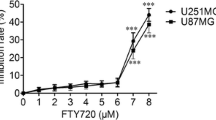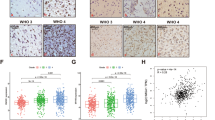Abstract
The antitumor effect of calycosin has been widely studied, but the targets of calycosin against glioblastomas are still unclear. In this study we focused on revealing c-Met as a potential target of calycosin suppressing glioblastomas. In this study, suppressed-cell proliferation and cell invasion together with induced-cell apoptosis appeared in calycosin-treated U251 and U87 cells. Under treatment of calycosin, the mRNA expression levels of Dtk, c-Met, Lyn and PYK2 were observed in U87 cells. Meanwhile a western blot assay showed that c-Met together with matrix metalloproteinases-9 (MMP9) and phosphorylation of the serine/threonine kinase AKT (p-AKT) was significantly down-regulated by calycosin. Furthermore, overexpressed c-Met in U87 enhanced the expression level of MMP9 and p-AKT and also improved cell invasion. Additionally, the expression levels of c-Met, MMP9 and p-AKT were inhibited by calycosin in c-Met overexpressed cells. However, an AKT inhibitor (LY294002) only effected on MMP9 and p-AKT, not on c-Met. These data collectively indicated that calycosin possibility targeting on c-Met and exert an anti-tumor role via MMP9 and AKT.





Similar content being viewed by others
References
Bellacosa A, Testa JR, Moore R and Larue L 2004 A portrait of AKT kinases: Human cancer and animal models depict a family with strong individualities. Cancer Biol. Ther. 3 268–275
Bladt F, Riethmacher D, Isenmann S, Aguzzi A and Birchmeier C 1995 Essential role for the c-met receptor in the migration of myogenic precursor cells into the limb bud. Nature 376 768–771
Brognard J, Clark AS, Ni Y and Dennis PA 2001 Akt/protein kinase B is constitutively active in non-small cell lung cancer cells and promotes cellular survival and resistance to chemotherapy and radiation. Cancer Res. 61 3986
Chen J, Hou R, Zhang X, Ye Y, Wang Y and Tian J 2014 Calycosin suppresses breast cancer cell growth via ERbeta-dependent regulation of IGF-1R, p38 MAPK and PI3K/Akt pathways. PLoS One 9 e91245
Chen J, Zhao X, Li X and Wu Y 2015 Calycosin induces apoptosis by the regulation of ERβ/miR-17 signaling pathway in human colorectal cancer cells. Food Funct. 6 3091–3097
Ellingson BM, Cloughesy TF, Zaw T, Lai A, Nghiemphu PL, Harris R, Lalezari S, Wagle N, Naeini KM and Carrillo J 2012 Functional diffusion maps (fDMs) evaluated before and after radiochemotherapy predict progression-free and overall survival in newly diagnosed glioblastoma. Neuro-Oncology 14 333
Ganipineni LP, Danhier F and Préat V 2018 Drug delivery challenges and future of chemotherapeutic nanomedicine for glioblastoma treatment. J. Controlled Release 281 42–57
Gao J, Liu ZJ, Chen T and Zhao D 2014 Pharmaceutical properties of calycosin, the major bioactive isoflavonoid in the dry root extract of Radix astragali. Pharm. Biol. 52 1217–1222
Granito A, Guidetti E and Gramantieri L 2015 c-MET receptor tyrosine kinase as a molecular target in advanced hepatocellular carcinoma. J. Hepatocell. Carcinoma 2 29–38
Guo C, Tong L, Xi M, Yang H, Dong H and Wen A 2012 Neuroprotective effect of calycosin on cerebral ischemia and reperfusion injury in rats. J. Ethnopharmacol. 144 768–774
Han Y, Luo Y, Zhao J, Mingchuan LI and Jiang Y 2014 Overexpression of c-Met increases the tumor invasion of human prostate LNCaP cancer cells in vitro and in vivo. Oncol. Lett. 8 1618–1624
Lemmon MA and Schlessinger J 2010 Cell signaling by receptor tyrosine kinases. Cell 141 1117–1134
Liu W, Fu Y, Xu S, Ding F, Zhao G, Zhang K, Du C, Pang B and Pang Q 2011 c-Met expression is associated with time to recurrence in patients with glioblastoma multiforme. J. Clin. Neurosci. 18 119–121
Manning BD and Cantley LC 2007 AKT/PKB signaling: Navigating downstream. Cell 129 1261–1274
Martens T, Schmidt NO, Eckerich C, Fillbrandt R, Merchant M, Schwall R, Westphal M and Lamszus K 2006 A novel one-armed anti-c-Met antibody inhibits glioblastoma growth in vivo. Clin. Cancer Res. 12 6144–6152
Matsumura A, Kubota T, Taiyoh H, Fujiwara H, Okamoto K, Ichikawa D, Shiozaki A, Komatsu S, Nakanishi M and Kuriu Y 2013 HGF regulates VEGF expression via the c-Met receptor downstream pathways, PI3K/Akt, MAPK and STAT3, in CT26 murine cells. Int. J. Oncol. 42 535–542
Nie XH, Jia OY, Xing Y, Li DY, Liu RE and Xu RX 2016 Calycosin inhibits migration and invasion through modulation of transforming growth factor beta-mediated mesenchymal properties in U87 and U251 cells. Drug Des. Dev. Ther. 10 767–779
Park H, Kim D, Kim E, Sa JK, Lee HW, Yu S, Oh J, Kim SH, Yoon Y and Nam DH 2017 Tumor inhibitory effect of IRCR201, a novel cross-reactive c-Met antibody targeting the PSI domain. Int. J. Mol. Sci. 18 1968
Qiu R, Ma G, Zheng C, Qiu X, Li X, Li X, Mo J, Li Z, Liu Y and Mo L 2014 Antineoplastic effect of calycosin on osteosarcoma through inducing apoptosis showing in vitro and in vivo investigations. Exp. Mol. Pathol. 97 17–22
Regad T 2015 Targeting RTK signaling pathways in cancer. Cancers (Basel) 7 1758–1784
Sennino B, Ishiguro-Oonuma T, Wei Y, Naylor RM, Williamson CW, Bhagwandin V, Tabruyn SP, You WK, Chapman HA and Christensen JG 2012 Suppression of tumor invasion and metastasis by concurrent inhibition of c-Met and VEGF signaling in pancreatic neuroendocrine tumors. Cancer. Discov. 2 270–287
Silvia H, Elisabeth R, Matthias P and Christine M 2014 Molecular biology of high-grade gliomas: What should the clinician know? Chin. J. Cancer 33 4–7
Stemke-Hale K, Gonzalez-Angulo AM, Lluch A, Neve RM, Kuo WL, Davies M, Carey M, Hu Z, Guan Y and Sahin A 2008 An integrative genomic and proteomic analysis of PIK3CA, PTEN, and AKT mutations in breast cancer. Cancer Res. 68 6084–6091
Stupp R, Hegi ME, van den Bent MJ, Mason WP, Weller M, Mirimanoff RO and Cairncross JG; European Organisation for Research and Treatment of Cancer Brain Tumor and Radiotherapy Groups; National Cancer Institute of Canada Clinical Trials Group 2006 Changing paradigms – an update on the multidisciplinary management of malignant glioma. Oncologist 11 165–180
Tian J, Wang Y, Zhang X, Ren Q, Li R, Huang Y, Lu H and Chen J 2017 Calycosin inhibits the in vitro and in vivo growth of breast cancer cells through WDR7-7-GPR30 signaling. J. Exp. Clin. Cancer Res. 36 153
Trovato M, Torre ML, Ragonese M, Simone A, Scarfì R, Barresi V, Giuffrè G, Benvenga S, Angileri FF and Tuccari G 2013 HGF/c-met system targeting PI3K/AKT and STAT3/phosphorylated-STAT3 pathways in pituitary adenomas: An immunohistochemical characterization in view of targeted therapies. Endocrine 44 735–743
Zhou L, Wu Y, Yang G, Li Y, Na L, Yi Y and Qin X 2017 Calycosin enhances some chemotherapeutic drugs inhibition of Akt signaling pathway in gastric cells. Cancer Investig. 35 289
Acknowledgements
Funding was provided by Social Development Project of Public Welfare Technology Research, from Science Technology Department of Zhejiang Province (Grant No. 2016C3220) and National Natural Science Foundation of China (Grant No. 81703752).
Author information
Authors and Affiliations
Corresponding author
Additional information
Communicated by Rita Mulherkar.
Corresponding editor: Rita Mulherkar
Rights and permissions
About this article
Cite this article
Nie, X., Zhou, Y., Li, X. et al. Calycosin down-regulates c-Met to suppress development of glioblastomas. J Biosci 44, 96 (2019). https://doi.org/10.1007/s12038-019-9904-4
Received:
Accepted:
Published:
DOI: https://doi.org/10.1007/s12038-019-9904-4




